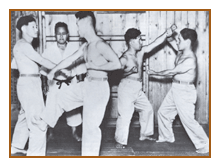 It is recommend that potential students visit the dôjô, during posted class times to observe training, prior to applying for admission to the dôjô. Visitors are asked to arrive at the dôjô prior to the start of practice, this will allow for introductions and a quick explanation of what they will be watching. During class, the instructors will check in with observers to see if they have any quick questions.
It is recommend that potential students visit the dôjô, during posted class times to observe training, prior to applying for admission to the dôjô. Visitors are asked to arrive at the dôjô prior to the start of practice, this will allow for introductions and a quick explanation of what they will be watching. During class, the instructors will check in with observers to see if they have any quick questions.
At the conclusion of practice, the class instructor will be able to discuss the class more completely. In addition to information about the dôjô from this website, it is important that potential members have a clear understanding of what to expect from training here. This will help ensure that the expectations of the dôjô and the prospective student are in harmony. Questions are encouraged.
Yama-ji conducts classes in a traditional manner. This is unlike a modern military academy or contemporary fitness center. A traditional dôjô is always a balance of formality and casualness. Martial arts practice is a potentially dangerous activity and should always be respected as such. Therefore, discipline, focus, honor, humility, respect and etiquette towards oneself and others are the key principles to this balance. It is important for students (and teachers) to maintain a good attitude, enthusiasm, dedication, and the ability to retain the receptiveness of a beginner’s mind.
Beginning students – especially those without prior martial arts experience or current participation in any athletics – are recommended to focus on just one of the arts taught. Martial arts practice is physically and mentally challenging. It is important for new students to build the requisite level of physical conditioning and basic skill without undue risk of injury or discouragement. However, it is permissible to study more than one art. Many members of the dôjô do train in more than one art with equal dedication and enthusiasm.



